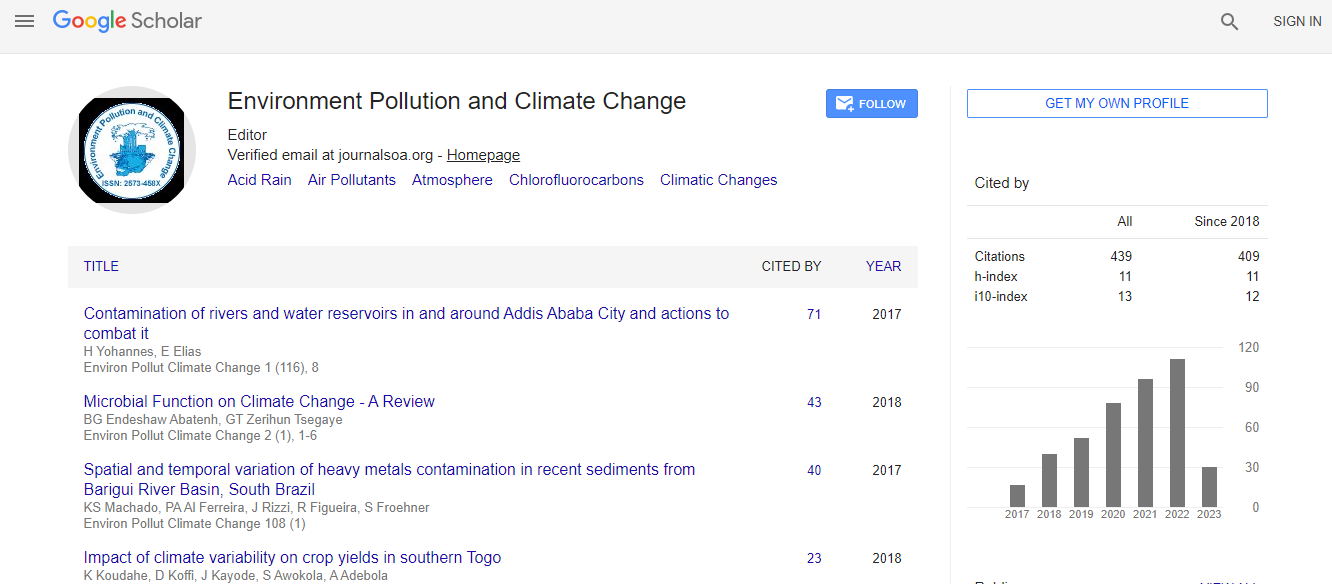Our Group organises 3000+ Global Conferenceseries Events every year across USA, Europe & Asia with support from 1000 more scientific Societies and Publishes 700+ Open Access Journals which contains over 50000 eminent personalities, reputed scientists as editorial board members.
Open Access Journals gaining more Readers and Citations
700 Journals and 15,000,000 Readers Each Journal is getting 25,000+ Readers
Google Scholar citation report
Citations : 672
Environment Pollution and Climate Change received 672 citations as per Google Scholar report
Environment Pollution and Climate Change peer review process verified at publons
Indexed In
- Google Scholar
- Publons
- Euro Pub
- ICMJE
Useful Links
Recommended Journals
Share This Page
A climate change vulnerability and capacity assessment (VCA) model for Caribbean Small Island Developing States (SIDS)
Joint Event on 5th World Conference on Climate Change & 16th Annual Meeting on Environmental Toxicology and Biological Systems
Marium Alleyne and John Charlery
The University of the West Indies, West Indies
Posters & Accepted Abstracts: Environ Pollut Climate Change
Abstract
Climate change is a high consequence issue for Small Island Developing States (SIDS) due to its proportional impact. While climate change is expected to aggravate environmental and socioeconomic conditions, SIDS possesses inherent characteristics which make them highly vulnerable to climate change. Vulnerability is a critical framework used to delineate the extent of climate change. A comprehensive understanding of the vulnerability of Caribbean SIDS specific to climate change will become a fundamental factor in ensuring sustainability and viability, as it provides the foundation for the identification of the optimum restorative action to reduce impacts through effective implementation. Traditional approaches to climate vulnerability assessment are limited by their ability to be transferred to SIDS, specifically the Caribbean region. Vulnerability is dynamic and despite strides in research, there is limited knowledge about the manner in which the dynamism of vulnerability operates, but any assessment methodology or tool must possess the ability to determine a balance in the system and any trends occurring. As knowledge about climate change impacts increases and changes in socio-economic and political circumstances occur there will be a continuous demand and need for new vulnerability approaches, tools and methods. Focusing on Caribbean SIDS, this research seeks to review the existing climate change vulnerability assessment methodologies, tools and models, highlighting strengths, weaknesses and resultant gaps, and pays particular attention to the potential elements of transferability to SIDS, with the aim of these to the Caribbean context. The resultant information will be used to develop a climate change VCA Model for Caribbean SIDS, based on the adaptation of VCA tools and methodologies for SIDS. This research contributes a climate change VCA model for Caribbean SIDS which could be applicable to others. Recent Publications 1. Kelman I (2018) Islandness within climate change narratives of Small Island Developing States (SIDS). Island Studies Journal 13(1):149–166. 2. Scandurra G, A A Romano, M Ronghi, and A Carfora (2018) On the vulnerability of Small Island Developing States: A dynamic analysis. Ecological Indicators 84:382–392. 3. Jurgilevich Alexandra, Aleksi Räsänen, Fanny Groundstroem and Sirkku Juhola (2017) A systematic review of dynamics in climate risk and vulnerability assessments. Environmental Research Letters 12(1):013002. 4. Mcleod Elizabeth, Shawn W Margles weis, Supin Wongbusarakum, Meghan Gombos, Angie Dazé, et al. (2015) Communitybased climate vulnerability and adaptation tools: a review of tools and their applications. Coastal Management 43(4):439–458. 5. O'Brien Karen, Siri Eriksen, Lynn P Nygaard and Ane Schjolden (2007) Why different interpretations of vulnerability matter in climate change discourses. Climate policy 7(1):73–88.Biography
Marium Alleyne is currently pursuing a PhD in Environmental Studies with specialization in Climate Change Vulnerability at the University of the West Indies, Cave Hill Campus, Barbados, W. I. She has her expertise in natural resource and environmental management, with an emphasis on climate change and is dedicated to contributing to the work on vulnerability and adaptive capacity to climate change and disaster risk management and reduction in Small Island Developing States (SIDS). She has four years’ experience, working on 14 climate change related projects in the Caribbean region. She has comprehensive knowledge of climate variability and climate change and its impacts on SIDS; experience in designing and structuring solutions that address/mitigate disaster and climate risks and contributed to increase climate change awareness and capacity at the country level.
E-mail: marium.alleyne@mycavehill.uwi.edu

 Spanish
Spanish  Chinese
Chinese  Russian
Russian  German
German  French
French  Japanese
Japanese  Portuguese
Portuguese  Hindi
Hindi 
